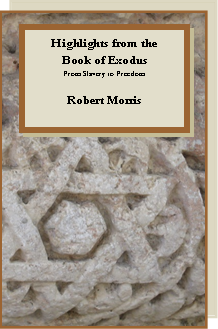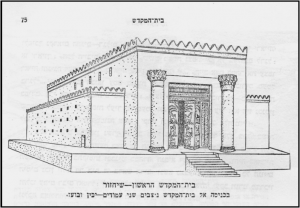שלום חברים
Shalom Dear Friends,

In March of 2010, Bethlehem Bible College, an evangelical Bible school in Bethlehem, organized a conference entitled “Christ at the Checkpoint.” The mission of the biennial meeting is “To Challenge Evangelicals to Take Responsibility to Help Resolve the Conflicts in Israel-Palestine by Engaging with the Teaching of Jesus on the Kingdom of God.” The mission statement sounds very good. However, upon closer investigation, serious shortcomings appear.
When the Christ and the Checkpoint Manifesto is assessed, serious deficiencies become apparent in the first article. The first article of the Manifesto reads:
The Kingdom of God has come. Evangelicals must reclaim the prophetic role in bringing peace, justice and reconciliation in Palestine and Israel.
My first concern is with the statement “The Kingdom of God has come.” Biblically, five facets make up the Kingdom of God. This statement does not sufficiently distinguish which facet they are referring to. I would agree with this statement if it is a reference to the “Mystery” form of the Kingdom of God.
The Mystery form is defined as conditions on earth during the King’s absence. This facet of God’s Kingdom program was not revealed to mankind until the coming of the Messiah. That is why we call it a “mystery.” It is explained in the Parables of Mark 4:1-34, Matt. 13:1-53, and Luke 8:4-18. It is not the Eternal Kingdom because it is limited to the time between the First and Second Coming. It is not the Spiritual Kingdom due to the fact that it includes believers and unbelievers. The Mystery Kingdom is not the Theocratic Kingdom because no King is ruling over Israel. The Mystery Kingdom is not the Messianic Kingdom. The King is present during the Messianic Kingdom and the Messianic Kingdom was no mystery. It is not the Church. It includes the Church and much more.
My next questions would be, what is the purpose of the Mystery form of the Kingdom? What are we to be doing while the King is absent? We have not been commanded to bring “peace, justice and reconciliation in Palestine and Israel.” Rather we have been commanded to:
Matthew 28:19-20 — Go therefore and make disciples of all the nations, baptizing them in the name of the Father and the Son and the Holy Spirit, teaching them to observe all that I commanded you; …
We have been commanded to evangelize and disciple the world and follow a specific procedure as we do so,
Romans 1:16 — For I am not ashamed of the gospel, for it is the power of God for salvation to everyone who believes, to the Jew first and also to the Greek.
It strikes me as rather sad and ironic that a conference claiming to be “evangelical” does not mention evangelism in its manifesto. Evangelism produces genuine peace, justice, and reconciliation between the individual and God. In turn, the individual now has the ability, through the indwelling Holy Spirit, to grow in his or her practical expression of peace, justice, and reconciliation between people. There can be no true peace, justice, or reconciliation between Israeli and Palestinian until the Prince of Peace rules in every person’s heart. The only coming together of Arab and Jew I have experienced is because we are united in Christ. By ignoring Jewish and Arab evangelism the conference is building on a foundation of sand.
I am afraid what we are seeing at the Christ at the Checkpoint Conference is simply a form of non-biblical, Liberation Theology cloaked under the term “evangelical.” Liberation Theology promotes liberation from unjust economic, political, or social conditions rather than liberation from sin. Liberation Theology does not guide the individual to the gift of eternal life based on a personal relationship with God by grace through faith (Eph. 2:8). It is a theology based on inconsistent hermeneutics (interpretation), Replacement Theology (the Church has replaced Israel), and Amillennialism (no Messianic Kingdom).
Liberation from unjust economic, political or social conditions is temporary and limited in scope and effectiveness. Economic, political, and social winds eventually change direction. Injustice always reigns somewhere in the world and we will always have the poor with us (Matt. 26;11 etc.).
While God is definitely interested in justice in the economic, political, and social spheres, and commands His followers to promote justice and righteousness, there is something more important at the top of His list. That is the elimination of the sin issue which is the source of all injustice and unrighteousness to begin with. We need to deal with the cause of injustice and unrighteousness, rather than the symptom.
When Yeshua, the Jewish Messiah, returns, He will bring the Mystery form of the Kingdom to a close and institute the 1,000 year Messianic or Millennial Kingdom. The Messianic Kingdom will usher in an era of peace, justice, and reconciliation unknown at our present time. That is our “blessed hope” (Titus 2:11-14). If we are experiencing the Messianic Kingdom today, God help us. It is not the Kingdom promised by the prophets (Isa. 4:2-6, 11:4-16, 32:15-20; Zech. 14:20-21; Psa. 72, 46:9, etc.).
Now, what about the Arab-Israeli conflict? Unfortunately, the Church will not bring an end to the Arab-Israeli conflict. The Church can bring reconciliation between individuals, but the Bible teaches that we will not be able to accomplish this reconciliation on a nationwide or worldwide scale. We know this because we are living in the end of the age and the Tribulation period is looming on the horizon. During the Tribulation, all nations will come against Jerusalem (Zech. 12:3, 9, 14:2) and that includes the Arab nations.
Don’t be distracted by the high sounding language of Christ at the Checkpoint. It appears to me that the bottom line of this program is an attempt to turn evangelical support away from the modern State of Israel using an appeal to justice, guilt, and libel. Rest assured, when Yeshua the Messiah returns all that is unjust will be corrected. All wrongs will be made right.
Isaiah 11:4—But with righteousness He will judge the poor, And decide with fairness for the afflicted of the earth; And He will strike the earth with the rod of His mouth, And with the breath of His lips He will slay the wicked.
Pray for us as we reach out with the Word of Life to Jew and Gentile alike.
Now available: Highlights from the Book of Exodus
 Highlights from the Book of Exodus has arrived, and is now available for purchase for only $20. Be sure to order your copy of this newest offering from HaDavar Discipleship Literature by Director Bob Morris.
Highlights from the Book of Exodus has arrived, and is now available for purchase for only $20. Be sure to order your copy of this newest offering from HaDavar Discipleship Literature by Director Bob Morris.
The Old Testament (Tenach) comprises 77% of the revelation God has given to mankind. However, the New Testament (Brit Chadashah), comprising 23% of God’s revelation, receives the lion’s share of attention from pastors, Bible schools, and seminaries. This imbalance has caused many to consider the Old Testament irrelevant and outdated.
How sad and how far from the truth. Many New Testament verses reference the Old Testament. Why? Because the New Testament was in the process of being written. The Old Testament was what Paul held in his hands. Here is what the Apostle Paul thought of the Old Testament:
2 Timothy 3:16 — All Scripture is inspired by God and profitable for teaching, for reproof, for correction, for training in righteousness; so that the man of God may be adequate, equipped for every good work.
See also Romans 15:4 and 1 Corinthians 9:9-10.
It is self-evident that there is great value, devotional inspiration, and practical application contained in the Old Testament for 21st century Christians. This book is written from that viewpoint. Each chapter is exegeted from a theologically conservative, literal, Jewish perspective so the reader will understand accurately what is happening in the chapter. Then, based on a clear conception of what is occurring, each chapter concludes with a practical or devotional application for today’s reader. I hope the book will prove to be a blessing to all who read it.
Now these things happened to them as an example, and they were written for our instruction, upon whom the ends of the ages have come.
1 Cor. 10:11
Tisha B’Av, also known as Ninth of Av, is the traditional day of mourning for the destruction of the temples in Jerusalem. This day usually occurs in July or August. This year, the date falls on August 5th.
According to Jeremiah 3:12, the Babylonian destruction of the First Temple occurred on the tenth of Av. However, II Kings 25:8-9 dated the event on the seventh of Av. According to the Tosefta Ta’anit 4:10, the discrepancy is due to the destruction of the outer walls and the courtyard, which started on the seventh of Av, while the entire structure was destroyed on the tenth of Av. Although some rabbis disagree, the majority decided that it is more fitting to remember the “beginning of the calamity.”
According to Josephus, the Romans destroyed the Second Temple in 70 A.D., on the tenth of Av. The Karaites still observe this day as a day of mourning. The ninth of Av was the date recorded by the Talmud and, therefore, became accepted as the anniversary of both destructions.
The Talmud classified the ninth of Av as a major day of mourning because of these five disasters:
- It was on the ninth of Av that the Children of Israel, after the Exodus from Egypt, were not allowed to enter the Promised Land;
- The First Temple was destroyed;
- The Second Temple was destroyed;
- The city of Bethar, the last city to fall during the Bar Kokhba war, was captured in 135 A.D.;
- In 136 A.D., Roman emperor Hadrian established a heathen temple on the site of the Solomonic Temple and rebuilt Jerusalem as a pagan city. Jews were then forbidden to enter the Holy City.
Based on these calamities, the ninth of Av became the symbol for all persecutions and misfortunes of the Jewish people, for the loss of national independence and for the sufferings in exile.
The Ninth of Av is the culmination of a three week period of increasing mourning, beginning with the fast on the 17th of Tammuz, which commemorates the first breach in the walls of Jerusalem, before the First Temple was destroyed. During the three week period, weddings and other parties are not permitted and people refrain from cutting their hair. Many of the traditional mourning practices are observed:
- Complete abstention from food and drink;
- Bathing is strictly forbidden: the washing of face and hands is permissible for cleansing purposes only;
- The use of oils for anointing and use of perfumes is forbidden; sexual intercourse is also forbidden;
- Wearing footwear made of leather is also forbidden;
- One must sit either on the ground or on a low stool, refrain from smiles, laughter and idle conversation;
- It is customary to not work and deal with business because Tisha b’Av was regarded as an inauspicious… day. Someone who works on the 9th of Av would not benefit from his efforts;
- The study of the Torah is forbidden because it is a source of joy, except for the reading of certain texts such as Lamentations, the Book of Job, the curses of Leviticus, and some chapters of Jeremiah.
In modern Israel, besides special synagogue services to commemorate the ninth of Av, public places of entertainment and restaurants are closed on the eve on Tisha b’Av.
Ask your Jewish friends about this holiday. Do they mourn? What does the Temple mean to them? Perhaps you will get an opportunity to talk about the fact that the New Testament teaches that the indestructible temple of the Lord is in the Believer’s heart (John 2:19-21, I Cor. 3:16; 6:19).
* Excerpt taken from Encyclopedia Judaica and Judaism 101.
** Picture credit: http://instruct1.cit.cornell.edu/courses/nes275/studentproj/fall05/rmb43/temple.jpg
HaDavarniks, thank you for being part of our ministry team.
– Bob


